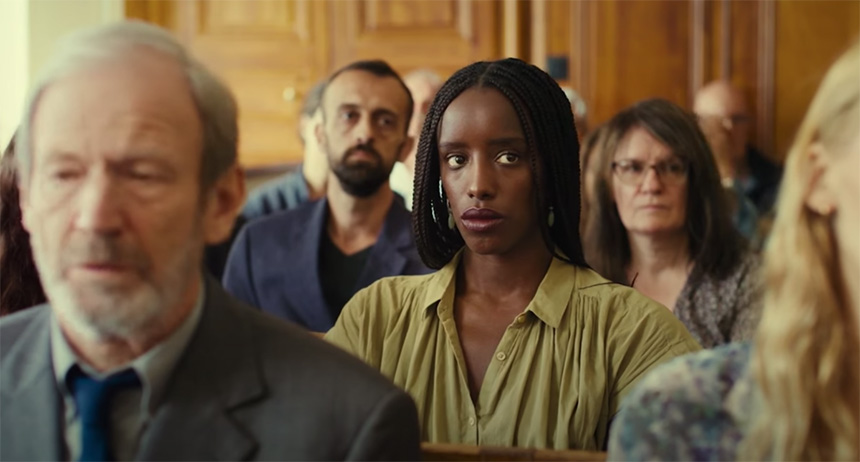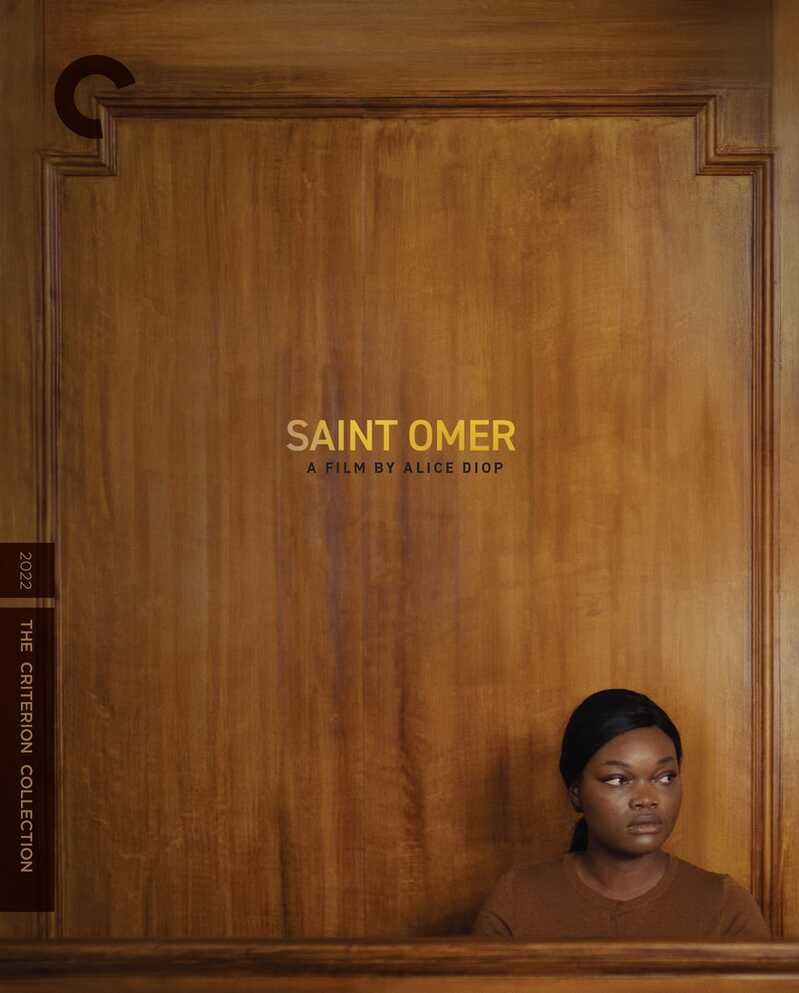SAINT OMER Blu-ray Review: The Divide Between Personhood and Motherhood

When it comes to dismantling discrimination, whether it be by race, gender, or other marginalized identity. does the law follow society, or society follow the law? While the public can often push for changes they want in society to be reflected in law, sometimes the law needs to go first. Though when it comes to certain people, support either from society or the law is minimal to non-existent, and nothing showcases this more than when a crime is committed, wherein societal expectations mean a person is demonized.
French documentarial Alice Diop's first narrative feature, Saint Omer, is based on the true story of a woman's murder of her child. But even within that sentence, the whole, complicated truth is missing. Hence Diop's meditative and unflinching investigation into this case via the fiction form - one which perhaps must occur due to the nature of the crime, and as a way to force an audience to examine their own societal expectations and prejudices.
Rama (Kayije Kagame), an author and professor, does not shy away from difficult subjects, especially when it comes to the subjugation of women. Still, even she might be tested by the trial she is about to sit in on. Laurence (Guslagie Malanga), a student and immigrant from Senegale, is on trial for the murder of her baby daughter, whom she left on a beach. That Laurence did this act does not seem to be in question; the trial is perhaps more to find why she did it, why she thinks she did it, and what is to be done with her.
Almost the entirety of the film is set in the courtroom. When Laurence is describing her life, or other witnesses are discussing Laurence, it's always about the words that they use, that the judge, jury, and the audience, must use to try and construct what happened, rather than a neutral relaying. There are often contradictory statements, particularly around Laurence. From her manner of speaking, it's clear she is intelligent and articulate, but she herself wants to understand her actions, in her continuing grief. But to so many around her, supported by the postcolonial system, she should be an unintelligent, inarticular African immigrant.
Why should she want to study a German philosopher, according to them, rather than an African one? So did she stop being a student beacuse she couldn't handle it, as those in charge of academia would believe, or was she just frustrated by a system that kept trying to pigeonhole her? And of course she might lie about the parenthood of her child, and try to find a nice old white man to look after her - rather than being lost and alone, and that white man preying on her as a person without strong enough attachments, stuck in a country that would sooner keep her under the proverbial boot.
Laurence seems to have been failed at every turn: by an indifferent mother, an angry father, a selfish partner, a discriminatory school. Alone without resources, this might not excuse her actions, but it also showcases what a lack of support does to a single human. For Rama watching this, she understands that this could be her, if her circumstances were slightly different: she too has a mother who seems difficult and indifferent. But what if she was that child not left on the beach? What does postpartum depression and psychosis do when the system is not there for support? As our own Dustin Chang pointes out in his review, the film "directly addresses the pressures and impossible situations many immigrants, and especially migrant women, find themselves in, in a foreign country where there's nowhere else to turn to. And the mind plays tricks on you when you are desperate. Irrational becomes rational."
Diop shows us these various portraits, framing her characters within the walls. She treats each scene as a frame, each moment as an infinite amount of time in which we can reflect on what we are seeing, the sublte nuances in gesture and word, to understand how Laurence was failed by so many, and how upsetting and still not surprising it still is, to see women failed, especially immigrant women, especially black women. It's not surprising that a mind with no solid ground on which to land, finds the unsolid ground of the notion of sorcery in their grasp - another stereotype which Laurence must fight against.
While only two years old, Saint Omer is well worthy of a Criterion treatment. A steady yet deep portrayal of a system that still keeps power in the hands of the white and the patriarchal, even as it claims to laud motherhood. Diop's fiction debut is as polished and precise as any of her previous documentary films, and just as relevant.
Special Features
The advantage of the more recent films released by Criterion, is having the filmmaker on hand to approve any restoration work - or in this case, making sure the transfer makes the film look as good as it did just a few years ago when it was first screened. This new 2K master with surround sound makes this film look and sound as rich and memorable as the first viewing.
There are two shorts interviews with Diop, from 2022 and 2023, which cover many of the same topics briefly: how the script was based on a true story, Diop's experience being in the courtroo, and how that transferred to her script and directing of the film. It's interesting to hear her discuss her decision not to make this a documentary (which had been her area of expertise), but that translating it to fiction would, in this instance, make for a better way to tell this story. She discusses how fiction and documentary are not as different as most would believe. She discusses her use of style and almost tableau to create the tone of the film and the focus on the characters.
A podcast from the Director's Guild of America, featuring an interview between Diop and filmmaker Dee Rees, is a highlight of these extras. Dees's particular insights into the film's narrative that delves into existential exhaustion, longing, reflection, parallels with the work of Truman Capote. You know it's a good interview when the interviewee keeps commenting on how good the questions are. They also discuss camera language and how Diop places the audience in the role of both observer and observee. There is also a clip of an on-stage discussion between Diop and scholar and philosopher Hélène Frappat. Frappat contributes more to this conversation, discussing the role of language in the film, how the history of women's use of language, in mythology (such as the stories of Medea and Cassandra) and real life, has meant we are often not believed, and how Diop extends this to her work.
Journalist and culture critic Jennifer Padjemi contributes an excellent essay, 'Shades of Motherhood'. She provides an overview of Diop's previous films, insight into how France still treats its black female filmmakers, which is extended into the film by how its characters are treated; a precise engagement with the themes of motherhood and stereotyping in film, as well as how that correlates to its counterpart in real life. It challenges the reader/viewer to look from the filmmakers, Rama's, and Laurence's perspective, rather than the white postcolonial system in which all are trapped.
Saint Omer
Director(s)
- Alice Diop
Writer(s)
- Alice Diop
- Amrita David
- Marie N'Diaye
Cast
- Kayije Kagame
- Guslagie Malanda
- Valérie Dréville








